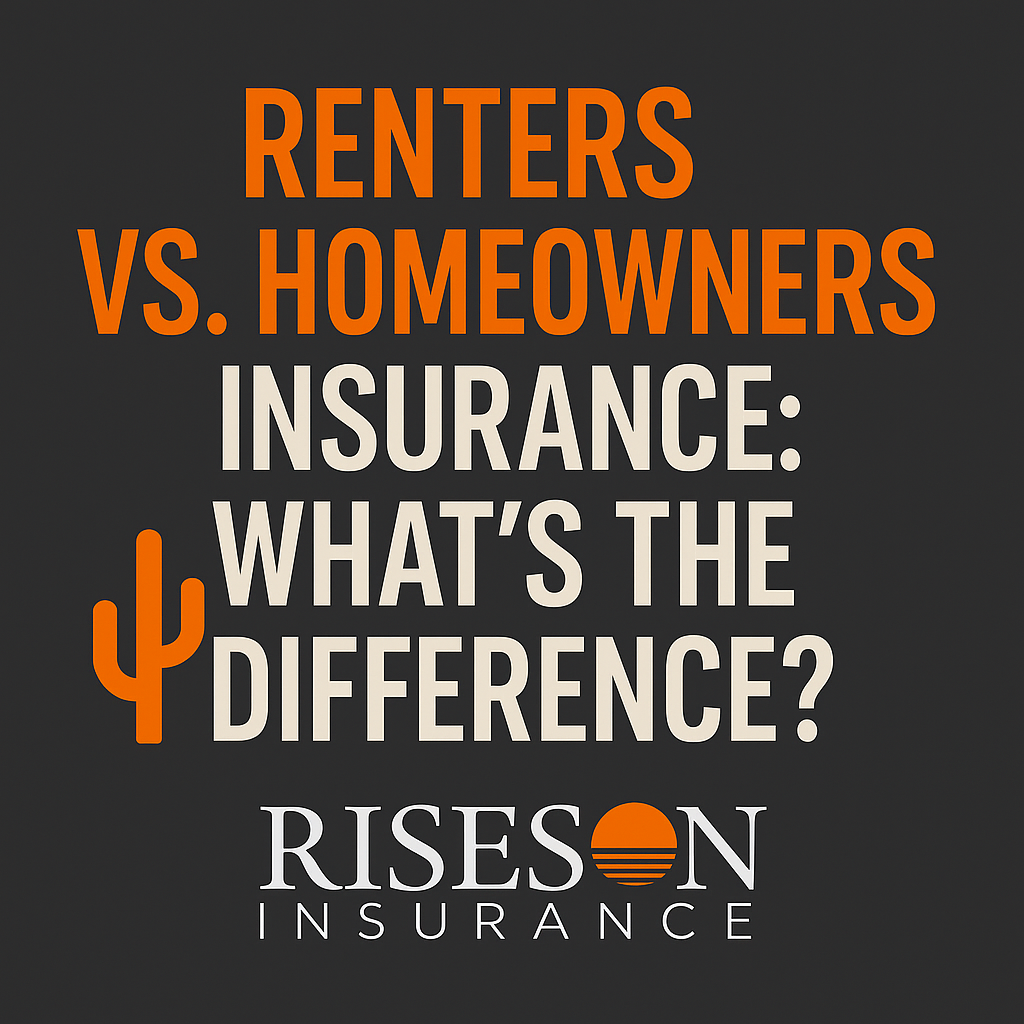Renters vs. Homeowners Insurance: What’s the Difference?
Renter's vs Homeowners' insurance Arizona

Introduction
If you are moving into a new place in Arizona, you might find yourself comparing renters' insurance and homeowners' insurance. At Riseson Insurance, we often hear from clients who are unsure which type of policy they need or what each one actually covers. Although these policies sound similar, they serve very different purposes and protect very different things.
Understanding the difference will help you choose the right coverage for your lifestyle and your property in Arizona.
1. Who Each Policy Is Designed For
Renters Insurance:
Designed for people who are renting an apartment, condo, or home. You are responsible for protecting your personal belongings and any liability inside your unit. You do not insure the structure itself.
Homeowners Insurance:
Designed for people who own their home. This includes the
building,
personal belongings,
liability coverage, and often
detached structures like sheds or garages.
2. What Each Policy Covers
Renters Insurance Covers:
- Personal property such as furniture, electronics, clothing, and valuables
- Personal liability if someone gets hurt in your home
- Loss of Use coverage for hotel stays and meals if your rental becomes uninhabitable
- Medical payments to others
Homeowners Insurance Covers:
- The physical structure of the home
- Personal property inside the home
- Detached structures such as fences or garages
- Personal liability and medical payments
- Loss of Use coverage for temporary housing
Homeowners insurance carries higher limits because it protects both the building and the personal belongings inside it.
3. Cost Differences
Renters insurance is significantly more affordable because it does not cover the building. Many Arizona renters pay $15 to $25 per month depending on location and coverage.
Homeowners insurance varies widely based on the home’s size, age, and risk factors. It generally costs more because it protects the structure, which is often the most expensive asset a person owns.
4. What Is Not Covered
Both renters and homeowners insurance have exclusions that Arizona residents should be aware of. Examples include:
- Flood damage
- Earthquakes
- Routine wear and tear
- Pest related damage
These events require separate endorsements or specialty policies depending on the carrier.
5. Why Liability Coverage Matters in Both Policies
Liability protection is important regardless of whether you rent or own. It covers you if someone is injured on your property or if you accidentally cause damage to someone else’s property.
For Arizona renters in apartments or college housing, liability coverage ensures you are financially protected if an accident happens. For homeowners, liability becomes even more important because you are responsible for the entire structure and surrounding property.
6. Choosing the Right Policy for Your Situation
Here is a quick way to decide:
- If you rent your living space, you need renters insurance.
- If you own your living space, you need homeowners insurance.
At Riseson Insurance, we help Arizona residents compare options from trusted carriers including Safeco, Travelers, AmShield, and Progressive. We explain the differences clearly so you can select the policy that fits your living situation and budget.
Summary
Renters insurance protects your belongings and liability. Homeowners insurance protects the physical structure and everything inside it. Understanding the difference helps you protect your home and your finances with confidence.
At Riseson Insurance, we help renters and homeowners across Arizona choose the right coverage for their living situation and long-term needs.
FAQ
Does renters' insurance cover the building
No. It only covers your belongings and liability.
Does homeowners insurance include personal property
Yes. It covers belongings and the structure.
Which is more expensive
Homeowners insurance typically costs more because it includes building coverage.
Disclaimer
Coverage options and limits vary by carrier and location. This article is for informational purposes only and not legal or insurance advice. Always review your policy with a licensed agent.
Recent Posts










